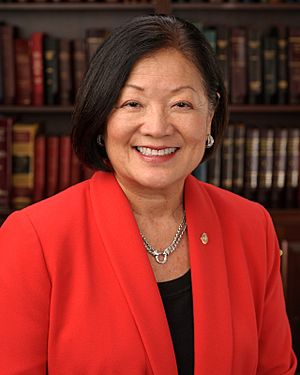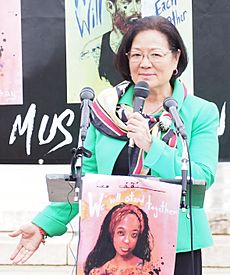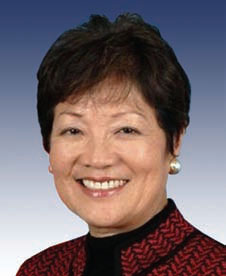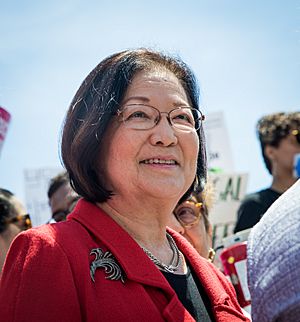Mazie Hirono facts for kids
Quick facts for kids
Mazie Hirono
|
|
|---|---|
|
広野 慶子
|
|

Official portrait, 2013
|
|
| United States Senator from Hawaii |
|
| Assumed office January 3, 2013 Serving with Brian Schatz
|
|
| Preceded by | Daniel Akaka |
| Member of the U.S. House of Representatives from Hawaii's 2nd district |
|
| In office January 3, 2007 – January 3, 2013 |
|
| Preceded by | Ed Case |
| Succeeded by | Tulsi Gabbard |
| 10th Lieutenant Governor of Hawaii | |
| In office December 2, 1994 – December 2, 2002 |
|
| Governor | Ben Cayetano |
| Preceded by | Ben Cayetano |
| Succeeded by | Duke Aiona |
| Member of the Hawaii House of Representatives |
|
| In office January 3, 1981 – December 2, 1994 |
|
| Preceded by | Clifford Uwaine David Hagino |
| Succeeded by | Terry Yoshinaga |
| Constituency | 12th district (1981–1983) 20th district (1983–1985) 32nd district (1985–1993) 22nd district (1993–1994) |
| Personal details | |
| Born |
Mazie Keiko Hirono
November 3, 1947 Koori, Fukushima, Japan |
| Political party | Democratic |
| Spouse |
Leighton Oshima
(m. 1987) |
| Residence | Honolulu, Hawaii |
| Education | University of Hawaiʻi at Mānoa (BA) Georgetown University (JD) |
| Signature | |
| Website | |
Mazie Keiko Hirono (born November 3, 1947) is an American lawyer and politician. Since 2013, she has served as a United States senator for the state of Hawaii. She is a member of the Democratic Party.
Hirono has made history in many ways. She is the first woman elected as a senator from Hawaii. She is also the first Asian-American woman elected to the Senate and the first U.S. senator who was born in Japan. Hirono is also the first Buddhist to serve in the Senate.
Before becoming a senator, Hirono was a member of the United States House of Representatives for Hawaii's 2nd congressional district from 2007 to 2013. She also served in the Hawaii House of Representatives and was the lieutenant governor of Hawaii from 1994 to 2002. In 2002, she ran for governor of Hawaii but lost to Linda Lingle.
In 2012, Hirono ran for the U.S. Senate and won against Lingle with 63% of the vote. She was reelected in 2018 and won a third term in 2024.
Early life and education
Mazie Hirono was born on November 3, 1947, in Fukushima Prefecture, Japan. Her mother was a Japanese American and her father was a Japanese veteran of World War II. In 1955, when Mazie was a young girl, her mother decided to move back to Hawaii with Mazie and one of her brothers.
Growing up in Honolulu, Hirono became a naturalized U.S. citizen in 1959. This means she went through the legal process to become a citizen since she was not born in the United States. She graduated from Kaimuki High School.
Hirono attended the University of Hawaii at Mānoa and earned a degree in psychology in 1970. She then went to Georgetown University Law Center in Washington, D.C., and earned a law degree in 1978. After finishing school, she returned to Honolulu to work as a lawyer.
Early political career
Hawaii House of Representatives (1981–1994)
In 1980, Hirono was elected to the Hawaii House of Representatives. This was the start of her long career in politics. She served there for 13 years, helping to create many new laws for the state of Hawaii. From 1987 to 1992, she was the head of the Consumer Protection and Commerce Committee, which works to protect the rights of customers.
Lieutenant governor (1994–2002)
In 1994, Hirono decided to run for a statewide office. She was elected as the lieutenant governor of Hawaii, serving with Governor Ben Cayetano. A lieutenant governor is like a vice president for a state. Their election was historic because Cayetano was the first Filipino American governor and Hirono was the first Japanese immigrant to become a lieutenant governor in the U.S.
As lieutenant governor, Hirono was known for her work on education. She led a project called the Pre-Plus program, which was the first statewide program in the nation to offer preschool for all children.
2002 election for governor
In 2002, Hirono ran for governor of Hawaii. She won a very close Democratic primary election. In the main election, she ran against Republican Linda Lingle, who was the mayor of Maui. Lingle won the election, becoming Hawaii's first female governor.
U.S. House of Representatives (2007–2013)
After her run for governor, Hirono decided to run for national office. In 2006, she was elected to the U.S. House of Representatives, representing Hawaii's 2nd district. She was reelected in 2008 and 2010 with large majorities.
During her time in the House, Hirono continued to focus on education and families. She was named a "Pre-K Champion" for her work on laws to support pre-kindergarten education. She also worked on laws to make sure women have access to healthcare and family planning services.
U.S. Senate (2013–present)

Elections
In 2011, Senator Daniel Akaka of Hawaii announced he would retire. Hirono decided to run for his open seat in the U.S. Senate. In the 2012 election, she once again faced Linda Lingle. This time, Hirono won the election by a large margin, receiving 63% of the vote. This victory made her Hawaii's first female senator.
Hirono was easily reelected to the Senate in 2018, winning with over 71% of the vote. In 2024, she won her third term.
Time in the Senate
As a senator, Hirono serves on several important committees, including the Judiciary Committee. This committee helps decide who becomes a federal judge and works on laws related to the justice system.
During the Brett Kavanaugh Supreme Court nomination hearings in 2018, Hirono became a well-known voice. She strongly supported Christine Blasey Ford, who had accused Kavanaugh of assault. Hirono urged people to listen to Ford's story and said that men needed to "shut up and step up. Do the right thing for a change."
After the January 6 United States Capitol attack in 2021, Hirono called for Senators Ted Cruz and Josh Hawley to resign. She believed they should not have objected to the results of the 2020 presidential election.
In 2021, Hirono sponsored the COVID-19 Hate Crimes Act. This bill was created to fight against hate crimes targeting Asian Americans. The bill passed the Senate with a vote of 94–1.
Committee assignments
- Committee on Armed Services
- Committee on Energy and Natural Resources
- Committee on Small Business and Entrepreneurship
- Committee on the Judiciary
- Committee on Veterans' Affairs
Political positions
Hirono is known for her liberal political views. She supports policies that are generally favored by the Democratic Party.
- Healthcare: Hirono is a strong supporter of the Affordable Care Act (also known as Obamacare). In 2017, she voted against a bill that would have repealed it. She also supports Medicare for All, a plan for a national health insurance program.
- Gun Control: Hirono supports stricter gun laws. In 2016, she took part in a filibuster (a long speech to delay a vote) to demand a vote on gun control measures. She was disappointed when a law to ban gun sales to people on the terrorist watchlist did not pass.
- Women's Rights: Hirono has a 100% rating from groups that support a woman's right to make her own healthcare choices. She believes that these personal decisions should be left to a woman and her doctor.
- LGBTQIA+ Rights: Hirono supports the rights of LGBTQ+ Americans. She believes they should be allowed to serve in the military and have the same rights as anyone else to adopt children or be foster parents.
Personal life
In May 2017, Hirono announced that she had been diagnosed with stage 4 kidney cancer. She had surgery to remove a kidney and received treatment. She returned to her work in the Senate soon after.
In 2021, Hirono published her autobiography, Heart of Fire: An Immigrant Daughter's Story. In the same year, the government of Japan awarded her the Order of the Rising Sun, Gold and Silver Star. This award recognized her work in strengthening the relationship between Japan and the United States.
See also
- List of Asian Americans and Pacific Islands Americans in the United States Congress
- List of female lieutenant governors in the United States
- List of United States senators born outside the United States
- Women in the United States House of Representatives
- Women in the United States Senate
 | Selma Burke |
 | Pauline Powell Burns |
 | Frederick J. Brown |
 | Robert Blackburn |



